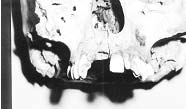'The Forensic Odontologist'
Article contributed by
James D. Wood, D.D.S.
Posted - Tuesday, September 28, 2004, at 02:39 AM, EST
Forensic Odontology is the application of dentistry to questions of law.
The vast majority of work performed by forensic odontologists is human
identification. As such, forensic odontologists work with Coroners and
Medical Examiners. Since teeth are the hardest substance in the body,
they survive well under adverse conditions where other tissue may not.
The unique characteristics of teeth and individual dental
restorations make comparison possible – assuming that good antemortem
(before death) dental radiographs are available.
Forensic odontology can be especially important in mass disasters
where severe fragmentation of human remains, or burning of remains
may occur. There are local, state, regional, and national dental mass
disaster response teams. These teams are composed mostly of dentists,
however trained dental hygienists and dental assistants are often parts
of the teams as well. Forensic Odontology was very important in identification
of victims in the aftermath of September 11, 2001 in Somerset, Pennsylvannia,
at the Pentagon and The World Trade Center in New York City. Dentists worked
closely with forensic pathologists, medical investigators, and forensic
anthropologists in the identification efforts.
Forensic Odontology is also important in the examination of bite marks –
human or animal – in tissue, food stuffs, and other materials. In cases
where evidence is well collected, comparisons of possible biters may be made
to lifesize photographs of patterned wound injuries. The higher quality the
evidence the more likely that the information has evidentiary value. Bite marks
and their analysis must be approached with caution. Bite marks are
not analogous to fingerprints – there is potential subjectivity in their analysis.
 Forensic Odontologists are also involved in the analysis of dental records for
fraud. They may also be consulted in age estimation, as well as documentation of
injury to the face and oral structures. As such, they may provide services for law
enforcement
agencies, private attorneys, state regulatory agencies and insurance companies.
Forensic Odontologists are also involved in the analysis of dental records for
fraud. They may also be consulted in age estimation, as well as documentation of
injury to the face and oral structures. As such, they may provide services for law
enforcement
agencies, private attorneys, state regulatory agencies and insurance companies.
For links to other forensic dental websites of interest go to
www.ncforensicodontology.org
About the Author
James D. Wood works with a group of Forensic Odontologists at
Northern California Forensic Odontology.
The group of 5 Forensic Dental Consultants viz;
James D. Wood, D.D.S
John Berk, D.D.S.
George Gould, D.D.S.
Kevin Landon, D.D.S. and
Duane Spencer, D.D.S.
have a total of over 140 years of dental experience; 4 have over 25 years experience
each in the field of forensic odontology.
Forensic Odontologists perform a variety of consulting services
for coroners and medical examiners, law enforcement agencies,
district attorneys, public defenders, private attorneys, and private individuals.
Mr. James D. Wood and his team of Forensic Dental consultants can be contacted at
Forensic Dental Consultants
102 South Main Street
Cloverdale, CA 95425
Tel: + 1 707 894 2464
Email: jwooddds@comcast.net
Website: http://www.ncforensicodontology.org

